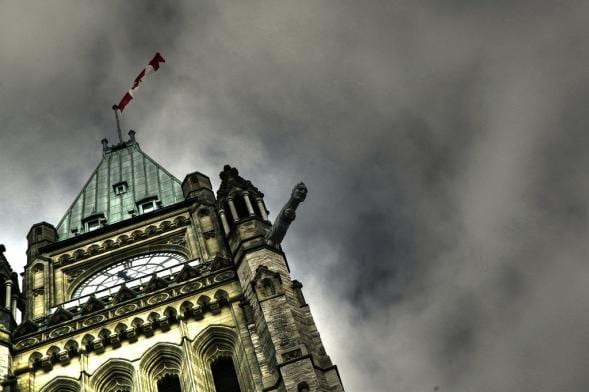Immigration Minister Jason Kenney has tabled Bill C-11, which aims to reform the immigration and refugee system in order to fast track certain refugee claims and to make it faster to deport others.
But one of the hallmarks of this system is the designation of certain countries as “safe countries of origin,” meaning that claimants who come from those countries will be dealt with in an expedited manner — and denied the ability to access the Refugee Appeals Division, the creation of which is a part of the reforms.
“Like all eligible refugee claimants, those from designated safe countries of origin would continue to receive a fair hearing on the merits of their claim before the IRB,” Kenney said at a press conference on Tuesday morning. “There would be no restriction of access. They could also ask the Federal Court to review the decision on their claim if they’ve failed at first instance, but we would limit their access to the Refugee Appeal Division and other appeals.”
Kenney claims the measures are necessary to deal with the spike in claims from countries like Mexico and Hungary — though he refused to name Hungary until pressed to do so.
According to Kenney, similar lists are employed in other comparable democratic countries such as those in the UN — the UK designates some 24 countries as “safe,” France designates 14 and Ireland and Germany designate two each.
For opposition parties, this designation of safe countries is problematic.
“The changes today are fast, but certainly not fair,” says the NDP’s immigration critic Olivia Chow. “A fast tracking of the entire process is necessary, but every refugee claimant must be treated equally. Prioritizing some countries over others is dangerous. Every person that faces persecution should be treated equally, no matter which country they came from, and they should have the same rights to law and regulations.”
As an example, Chow says that Ghana is on the UK’s safe list, but homosexuality is illegal in that country. Similarly, Mali is a democracy, and yet they practise genital mutilation.
“We can’t assume a country is free from all forms of persecution just because it is democratic,” Chow says.
Liberal immigration critic Maurizio Bevilacqua expresses similar concerns.
“That idea needs to be explored further,” Bevilacqua says. “I know the United Nations Commissioner also stated some concerns, as have other organizations, but the minister needs an opportunity to explain himself on the particular issues. Other countries have used it and continue to use it in some way in an effective manner, but I have yet to hear from the minister as to how his version would work.”
Kenney says the list would be designated by a panel of public servants from relevant ministries along with representatives from the United Nations High Commission for Refugees (UNHCR) and tabled before Parliament. Chow wants the list to be part of legislation, which goes before Parliament, rather than a part or regulation, which can be done without Parliamentary approval.
Kenney also raises the prospect of giving the IRB the power to identify sub-populations in certain safe countries like the UK does.
“Take for instance a democratic African country,” Kenney says. “Britain can decide that men are well protected in that country but women are not. We can also take a similar approach to sub-populations.”
For Janet Dench, executive director of the Canadian Council of Refugees, the idea of a list of safe countries of origin is a bad one.
“It will lead to certain refugees being denied the protection that they need, and particularly there are certain categories of refugees that, from experience with the current system, we know would be particularly vulnerable under a system like that because they may be claims that are successful from countries that otherwise are seen as being democratic and quite peaceful.”
Dench lists queers and gender-based claims as particularly vulnerable.
This is complicated by the increased importance being placed on first interviews with refugee claimants, that are to be conducted within eight days of arrival in the country.
“Women who have been sexually assaulted, gays and lesbians who have suffered homophobic attacks — they may not immediately mention those kinds of things in their first interview,” Dench says. “When they subsequently say oh, by the way I’m gay and that’s the main reason I’m making a claim, [the bureaucrats] can then use that against them and say ‘Oh, you didn’t mention that when you first arrived, so we don’t find you credible.'”
“That to us is very dangerous, and it’s based on a misconception of the refugee experience,” Dench says.
As well, preventing claimants from “safe” countries access to the Refugee Appeals Division is something Dench finds perverse.
“To some extent those claims are going to be the most difficult to assess, because there are these issues of state protection, and these are often the most difficult ones, the most controversial ones at the Refugee Board. With gays and lesbians, homophobic violence — is the state offering protection or not? Is it really effective? Those are questions which are complicated and difficult to do, and where the [Refugee] Appeal Division would be particularly important.”
Neither the Liberals nor NDP have yet decided if they will support the bill.
“I’ve been consulted on this particular package,” Bevilacqua says. “I was happy to see that some of the ideas I promoted are there, but I’m certainly not happy with the entire package, and I look forward to studying the issues and inviting witnesses [before committee], because this particular reform package requires input. The United Nations has concerns — we have to listen to what they have to say.”
Dale Smith is Xtra’s federal politics reporter. Read his blog Hill Queeries every weekday.


 Why you can trust Xtra
Why you can trust Xtra


